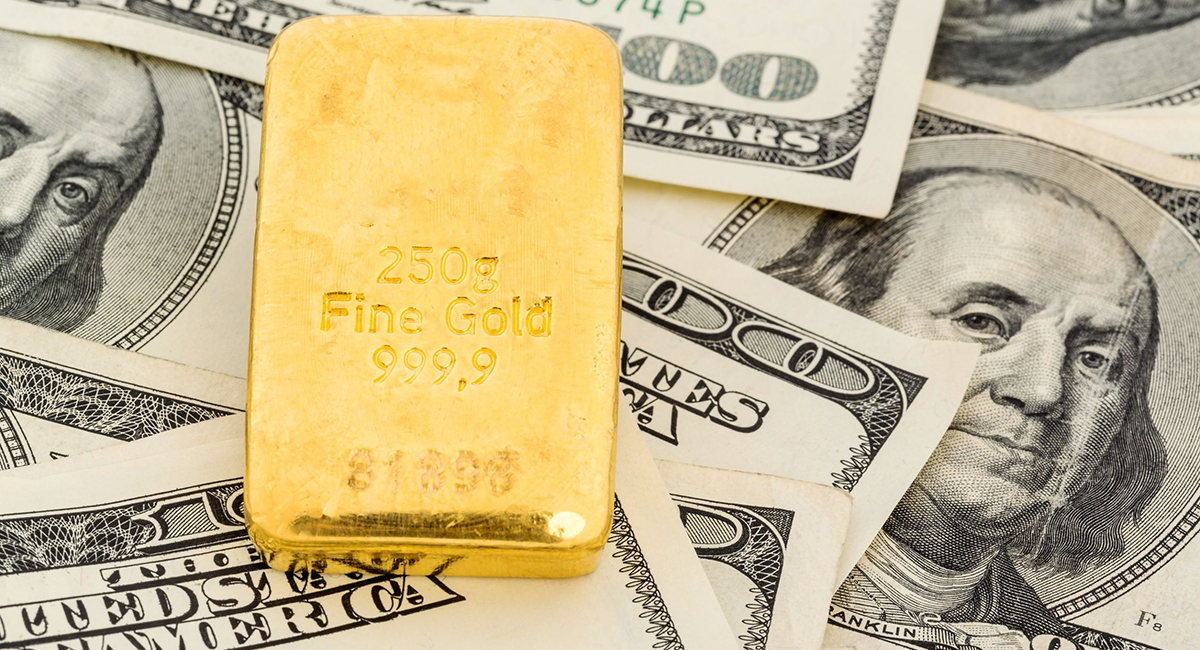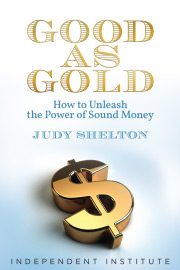Let’s go back to the gold standard.
If the very idea seems at odds with what is currently happening in our country—with Congress preparing to pass a massive economic stimulus bill that will push the fiscal deficit to triple the size of last year’s record budget gap—it’s because a gold standard stands in the way of runaway government spending.
Under a gold standard, if people think the paper money printed by government is losing value, they have the right to switch to gold. Fiat money—i.e., currency with no intrinsic worth that government has decreed legal tender—loses its value when government creates more than can be absorbed by the productive real economy. Too much fiat money results in inflation—which pools in certain sectors at first, such as housing or financial assets, but ultimately raises prices in general.
Inflation is the enemy of capitalism, chiseling away at the foundation of free markets and the laws of supply and demand. It distorts price signals, making retailers look like profiteers and deceiving workers into thinking their wages have gone up. It pushes families into higher income tax brackets without increasing their real consumption opportunities.
In short, inflation undermines capitalism by destroying the rationale for dedicating a portion of today’s earnings to savings. Accumulated savings provide the capital that finances projects that generate higher future returns; it’s how an economy grows, how a society reaches higher levels of prosperity. But inflation makes suckers out of savers.
If capitalism is to be preserved, it can’t be through the con game of diluting the value of money. People see through such tactics; they recognize the signs of impending inflation. When we see Congress getting ready to pay for 40% of 2009 federal budget expenditures with money created from thin air, there’s no getting around it. Our money will lose its capacity to serve as an honest measure, a meaningful unit of account. Our paper currency cannot provide a reliable store of value.
So we must first establish a sound foundation for capitalism by permitting people to use a form of money they trust. Gold and silver have traditionally served as currencies—and for good reason. A study by two economists at the Federal Reserve Bank of Minneapolis, Arthur Rolnick and Warren Weber, concluded that gold and silver standards consistently outperform fiat standards. Analyzing data over many decades for a large sample of countries, they found that “every country in our sample experienced a higher rate of inflation in the period during which it was operating under a fiat standard than in the period during which it was operating under a commodity standard.”
Given that the driving force of free-market capitalism is competition, it stands to reason that the best way to improve money is through currency competition. Individuals should be able to choose whether they wish to carry out their personal economic transactions using the paper currency offered by the government, or to conduct their affairs using voluntary private contracts linked to payment in gold or silver.
Legal tender laws currently favor government-issued money, putting private contracts in gold or silver at a distinct disadvantage. Contracts denominated in Federal Reserve notes are enforced by the courts, whereas contracts denominated in gold are not. Gold purchases are subject to taxes, both sales and capital gains. And while the Constitution specifies that only commodity standards are lawful—“No state shall coin money, emit bills of credit, or make anything but gold and silver coin a tender in payment of debts” (Art. I, Sec. 10)—it is fiat money that enjoys legal tender status and its protections.
Now is the time to challenge the exclusive monopoly of Federal Reserve notes as currency. Buyers and sellers, by mutual consent, should have access to an alternate means for settling accounts; they should be able to do business using a monetary unit of account defined in terms of gold. The existence of parallel currencies operating side-by-side on an equal legal footing would make it clear whether people had more confidence in fiat money or money redeemable in gold. If the gold-based system is preferred, it means that people fully understand that the purpose of money is to facilitate commerce, not to camouflage fiscal mismanagement.
Private gold currencies have served as the medium of exchange throughout history—long before kings and governments took over the franchise. The initial justification for government involvement in money was to certify the weight and fineness of private gold coins. That rulers found it all too tempting to debase the money and defraud its users testifies more to the corruptive aspects of sovereign authority than to the viability of gold-based money.
Which is why government officials should not now have the last word in determining the monetary measure, especially when they have abused the privilege.
The same values that will help America regain its economic footing and get back on the path to productive growth—honesty, reliability, accountability—should be reflected in our money. Economists who promote the government-knows-best approach of Keynesian economics fail to comprehend the damaging consequences of spurring economic activity through a money illusion. Fiscal “stimulus” at the expense of monetary stability may accommodate the principles of the childless British economist who famously quipped, “In the long run, we’re all dead.” But it shortchanges future generations by saddling them with undeserved debt obligations.
There is also the argument that gold-linked money deprives the government of needed “flexibility” and could lead to falling prices. But contrary to fears of harmful deflation, the big problem is not that nominal prices might go down as production declines, but rather that dollar prices artificially pumped up by government deficit spending merely paper over the real economic situation. When the output of goods grows faster than the stock of money, benign deflation canoccur—it happened from 1880 to 1900 while the U.S. was on a gold standard. But the total price-level decline was 10% stretched over 20 years. Meanwhile, the gross domestic product more than doubled.
At a moment when the world is questioning the virtues of democratic capitalism, our nation should provide global leadership by focusing on the need for monetary integrity. One of the most serious threats to global economic recovery—aside from inadequate savings—is protectionism. An important benefit of developing a parallel currency linked to gold is that other countries could likewise permit their own citizens to utilize it. To the extent they did so, a common currency area would be created not subject to the insidious protectionism of sliding exchange rates.
The fiasco of the G-20 meeting in Washington last November—it was supposed to usher in “the next Bretton Woods”—suggests that any move toward a new international monetary system based on gold will more likely take place through the grass-roots efforts of Americans. It may already be happening at the state level. Last month, Indiana state Sen. Greg Walker introduced a bill—“The Indiana Honest Money Act”—which would, if enacted, allow citizens the option of paying in or receiving back gold, silver or the equivalent electronic receipt as an alternative to Federal Reserve notes for all transactions conducted with the state of Indiana.
It may turn out to be a bellwether. Certainly, it’s a sign of a growing feeling in the heartland that we need to go back to sound money. We need money that works for the legitimate producers and consumers of the world—the savers and borrowers, the entrepreneurs. Not money that works for the chiselers.









